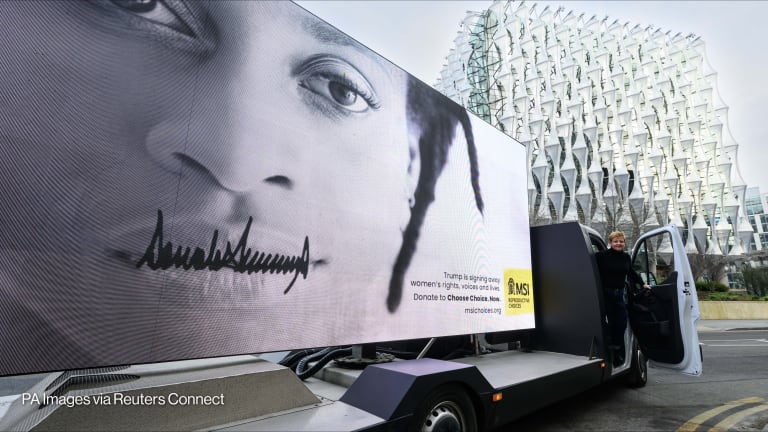What drives a feminist foreign policy?
New research from the International Women’s Development Agency suggests organizations advocating feminist foreign policies may need to rethink their approach.
New research from the International Women’s Development Agency concludes feminist foreign policy is created through transformative political change — driven by an individual in government willing to challenge the political norms. The findings require a shift in how NGOs and civil society engage the government to create change in this area of policy. “This is a challenging finding,” Alice Ridge, research, policy, and advocacy adviser at IWDA, explained. “We’re working through what this implication means for our work.” The research, presented at the 2021 Commission on the Status of Women Australia conference, analyzed the drivers for countries that have announced feminist foreign policies — Sweden, Canada, France, Luxembourg, Mexico, and Spain. In Sweden, a feminist foreign policy has resulted in issues affecting women and girls being a focus of discussion and negotiations at multilateral forums. In Canada, it aligned development assistance with improved objectives for women and girls. And in France, the policy enabled gender to be a focal point of discussion at the G-7 summit. In researching feminist foreign policy, a challenge is a lack of a global definition. For some, it is about driving women in leadership — including as foreign ministers and ambassadors. Through the work IWDA has conducted, Ridge said there are three elements that contribute to a true feminist foreign policy: gender as the central goal of foreign policy that is mainstreamed across all areas of policy including defense, trade, diplomacy, and development; policy that is intersectional; and policy that is backed up by accountability mechanisms. What are the drivers for a feminist foreign policy? According to Ridge, the announcement of feminist foreign policies came as a surprise to NGOs, civil societies as well as bureaucracies. Rather than being the result of a consultative process, they were rapidly driven by a minister or leader going out on a limb. Tipping points and a desire to “make a splash” internationally were important drivers of these sudden policy shifts. Sweden announced their feminist foreign policy when bidding for a seat in the United Nations Security Council, France when it was hosting a G-7 summit, and Mexico while it was co-hosting the Generation Equality Forum. A strong background in women, peace, and security — allowing for a feminine lens in a traditionally masculine space — was also an important driver. Advocacy from civil society and feminist groups helped pave the way too, creating an environment where the announcement would be welcomed and celebrated. The implication of this research, Ridge said, was that traditional policy processes might not be the best way to drive change. Nurturing relationships with progressive leaders might instead be the best approach. And it required a dramatically different approach to foreign policy. “The idea that feminist foreign policy is about tweaking the system can’t work,” Leanne Smith, director of the Whitlam Institute, explained. A feminist foreign policy, she said, cannot be adding on to existing policies and practices — instead, it requires transformative change from an entirely new starting point. “If it was feminist … you are redistributing the power back to those who really should be making the decision and setting the agenda — and that should be the feminist movement." --— Virisila Buadromo, co-lead, Urgent Action Fund for Women’s Human Rights in Asia and the Pacific How have feminist foreign policies translated? Despite progressive policies driven at the highest levels of government, Virisila Buadromo, co-lead of the Urgent Action Fund for Women’s Human Rights in Asia and the Pacific, argued that they are not producing transformative action on the ground. “You’re just talking about resources,” she said. “There’s been an increase in resources going to women and girls since the rise of discussion around [feminist foreign policies] and more government declaring their foreign policies are feminist.” While there has been an increase in resources going to women and girls, what is going directly into the hands of feminist civil society organizations is, she described, “minimal” — with a lot of conditionality linked to it. “If it was feminist, the idea would be that you are redistributing the power back to those who really should be making the decision and setting the agenda — and that should be the feminist movement and women’s and girl’s organizations that are living in those countries and know the issues,” Buadromo said. “They can define their own solutions.” For governments seeking to make a real change that supports a feminist foreign policy, she said, talking to feminist movements needs to be the first step — with their aim to decolonize any support provided to a region. For a feminist foreign policy to work, it also needs to be intersectional — a factor not widely considered according to Anuradha Mundkur, gender expert and lecturer at Flinders University. “It does not recognize that gender comes into almost existence in and through our relation[ships] with other identities such as race, class, and sexuality,” she said. “These are often contradictory and conflicting in the way we experience power and privilege or marginalization.” Without consideration of intersectionality, women of color, in particular, become marginalized. A feminist foreign policy needs to consider gender at home equally In Australia, there are questions as to whether it has accidentally developed a feminist foreign policy through its leadership — a female foreign minister, female secretary at the Department of Foreign Affairs and Trade, a high proportion of female ambassadors, and high commissioners. “But if you were a recipient of an Australian aid project reading news about Australia right now, you’d just laugh,” Smith said. Allegations of rape within Australia’s Parliament house; sexual acts committed in the offices of female parliamentarians; and sitting ministers accused of historic sex crimes have plagued the government in recent weeks — with the response of Australia’s prime minister lacking the urgency needed to support and respond to the needs of women. After a women’s march for justice earlier in the month, which saw a large national turnout, Prime Minister Scott Morrison’s comments in Parliament suggested that women should be happy they could protest without being shot. Amy Haddad, head of gender at Tetra Tech, explained that feminist foreign policy must be equally implemented at home and abroad. This ensures the policymakers are true to feminist objectives in all aspects of government service delivery. Australia’s actions at home could override any attempt at a genuine feminist foreign policy. What have feminist foreign policies achieved? Although the first feminist foreign policy was announced in 2014, there is limited data available on how this has translated into change for women and girls globally. The value of gender projects funded through development assistance, available from the Organisation for Economic Co-operation and Development, is the best available information. Between 2014 and 2019, a 67% increase in funding was directed to programs with a principal or significant gender component. But money alone does not drive change. To build, show, and sustain change through a feminist foreign policy, Mundkur said it is essential to consult widely with diverse women’s organizations — and listen. “Diverse women are constantly inputting into … foreign policymaking … and then there is no accountability as to why they are not listening to those voices. That lack of accountability is really stark in foreign policy.” In the research, Ridge explained that accountability was an increasingly important need. As part of their feminist foreign policy, governments needed to listen to civil society feedback and adapt to changing needs — it needs to be an approach taken both internationally and domestically. “That seems to be really coming through strongly as a critical factor in having a legitimate policy,” she said.
New research from the International Women’s Development Agency concludes feminist foreign policy is created through transformative political change — driven by an individual in government willing to challenge the political norms. The findings require a shift in how NGOs and civil society engage the government to create change in this area of policy.
“This is a challenging finding,” Alice Ridge, research, policy, and advocacy adviser at IWDA, explained. “We’re working through what this implication means for our work.”
The research, presented at the 2021 Commission on the Status of Women Australia conference, analyzed the drivers for countries that have announced feminist foreign policies — Sweden, Canada, France, Luxembourg, Mexico, and Spain. In Sweden, a feminist foreign policy has resulted in issues affecting women and girls being a focus of discussion and negotiations at multilateral forums.
This story is forDevex Promembers
Unlock this story now with a 15-day free trial of Devex Pro.
With a Devex Pro subscription you'll get access to deeper analysis and exclusive insights from our reporters and analysts.
Start my free trialRequest a group subscription Printing articles to share with others is a breach of our terms and conditions and copyright policy. Please use the sharing options on the left side of the article. Devex Pro members may share up to 10 articles per month using the Pro share tool ( ).
Lisa Cornish is a former Devex Senior Reporter based in Canberra, where she focuses on the Australian aid community. Lisa has worked with News Corp Australia as a data journalist and has been published throughout Australia in the Daily Telegraph in Melbourne, Herald Sun in Melbourne, Courier-Mail in Brisbane, and online through news.com.au. Lisa additionally consults with Australian government providing data analytics, reporting and visualization services.








